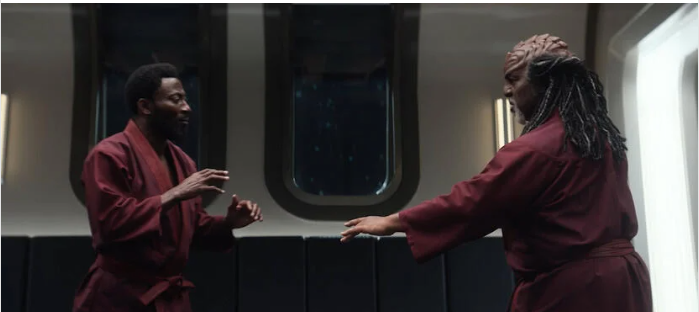
After last week's episode 2.7, which had almost as much good comedy as "The Trouble with Tribbles," Star Trek: Strange New Worlds returned with episode 2.8, about as deadly serious and ethically complex and wrenching as it gets.
[Spoilers ahead ...]
The set-up: a Klingon General, Dak 'Rah, who slaughtered many humans including babies, has apparently had a change of heart, has defected from the Klingons and decided to pursue a path of peace, and has boarded the Enterprise with Pike's cautious approval.
Not everyone on board is comfortable with Pike's decision. In particular, M'Benga and Chapel were in the place where Dak'Rah did his worst work. We see most of their horrendous story down there, and come to understand their unremitting antipathy to Dak'Rah. (As an important sidenote, we also see that Chapel's turmoil about this runs so deep that she pushes Spock away when he tries to get Chapel to talk about this. Which is completely understandable, but I was not happy to see that.)
There's some question, at first, about whether Dak'Rah is sincere in his pacifism, but we eventually learn, in one of the more shocking developments in this series, that M'Benga, feeling guilty (to say the least) about how that battle with Dak'Rah's Klingon years ago changed him from a doctor to a killer, kills Dak'Rah as the two are arguing about war and peace. Chapel sees this, and she and M'Benga lie to Pike about what happened, telling the Captain that it was Dak'Rah who turned violent on the Enterprise, and M'Benga killed the not-so-repentant Klingon in self-defense.
I'm not sure that Pike believes M'Benga, and I don't like that Chapel and M'Benga lied to the Captain. What would have happened had they told Pike the truth? Were they concerned that Pike would have had no choice but to suspend them from theirs posts, and bring M'Benga up on charges? I can't see Pike doing that. But maybe M'Benga lied so as not to put Pike in that position. In addition to saving his own neck? Well, he's only human.
As I said at the beginning, an ethically wrenching and complex story, and the makings of another very different hour of great television.
See also Star Trek: Strange New Worlds 2.1: Nurse Chapel ... 2.2: Racism and Sexism in the Courtroom ... 2.3: Time Travel and Alternate Universes ... 2.5: Chapel and Spock ... 2.6: Jimmy Kirk ... 2.7: Pike, Spock, and Boimler
And see also Star Trek: Strange New Worlds 1.1-1.2: Great Characters, Actors, Stories ... 1.3: "Instead of terraforming planets, we modify ourselves ..." ... 1.4: The Gorn and the Wub ... 1.5 Going to the Chapel ... 1.6: Two Stories ... 1.7: The Kiss ... 1.8: Ends of the Continuum ... 1.9: Momentous! ... 1.10: Everything!

2 comments:
With all due respect, this episode was a mess. In choosing not to show exactly what happened in the fatal fight, the show left the issue of who was ultimately to blame for the killing completely in shadow, which means that any moral/ethical point they were trying to make was equally obscured. Making M’benga the real “butcher” was a nice twist, but it left the question of his desire for “justice” hopelessly muddled with the question of his own shame for having been revealed to be as bloodthirsty a killer as the Klingon. Nor did it truly make any sense that the Klingon had to concoct the lie that he was the “butcher” — he would have been an equally sympathetic “reformed war criminal” for simply having abandoned the battle field without this convoluted plot twist about M’benga being the real killer. It takes real writing chops and clarity of moral vision to pull off a nuanced ethical dilemma in this kind of drama. Just concocting a horrific war backstory and flipping expectations of who did what to whom does not a compelling morality play make.
Thanks for the comment, Steven. I don't disagree that the ethical quandary might have been more clearly drawn, but the episode still brought that home to me the way it was. As always, different strokes for different folks.
Post a Comment